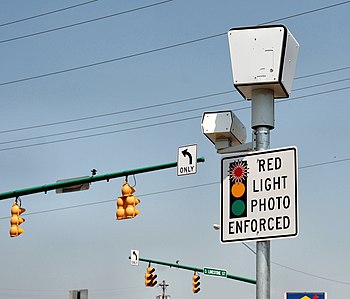
Red-light cameras sound like easy money to revenue-hungry city governments. Instead of paying police officers to enforce traffic laws and ticket offenders, they outsource the job to companies like American Traffic Solutions and Redflex. Those firms install the cameras, monitor their output, and sometimes even handle the mailing of traffic tickets to motorists who run red lights, collecting a share of the fines from their government clients in return for their services.
But Americans aren’t very comfortable with receiving traffic tickets from private sector corporations on the basis of remote video monitoring.
Among other problems, they note that it’s generally impossible to establish who was driving a car when it ran a red light without actually pulling the driver over at the scene. They also question the legality of allowing private sector actors, often not even located in the same states as the alleged offenders, to issue traffic citations. And of course there’s the “creepy” factor: Most Americans read George Orwell’s 1984 in high school. We don’t like the idea of being watched everywhere we go.
The cities, and the companies, claim that the cameras are all about safety rather than revenue. They cite statistics claiming reduced fatality numbers at intersections equipped with the cameras. But a 2014 report from Florida’s Office of Program Policy Analysis and Governmental Accountability says that traffic accidents increase by 12% — and that rear-end collisions of the type occasioned by sudden brake application to avoid running lights increase by a whopping 35% — at such intersections.
Citizen protests — and legislative and judicial responses to those protests — are beginning to cut into the red-light camera racket. On March 16, two Broward County, Florida judges threw out 24,000 red-light camera tickets, representing $6.3 million in prospective revenue. The reason? While local police departments formally issued the tickets, they did so on the assurances of American Traffic Solutions employees in Arizona, not on their own observation of offenses or even on the basis of viewing the videos themselves.
Which brings up a fourth problem. The cities with red-light cameras, and the companies which operate them, note that these systems free up police officers for other duties. They sell that as a feature. I consider it a bug.
Cops who aren’t kept busy enforcing traffic safety laws are freed up to instead enforce laws against victimless “crimes” like gambling, prostitution and drug possession. When we consider the results — a burgeoning US prison population and growing body count of Americans gunned down by police officers on our streets — it may be that red-light cameras cost more than they bring in.
Real privatization is about getting government out of various areas of our lives, not leaving it in charge of those areas while allowing it to shunt the actual work off to unaccountable, rent-seeking “private” actors. If city governments want to privatize their streets, they should put those streets up for auction. Otherwise, they should shoulder the costs and the responsibilities of providing public roadways themselves.
Thomas L. Knapp is director and senior news analyst at the William Lloyd Garrison Center for Libertarian Advocacy Journalism (thegarrisoncenter.org). He lives and works in north central Florida.
PUBLICATION/CITATION HISTORY
- “Fake Privatization: Shut Down the Red-Light Racket,” by Thomas L. Knapp, Iowa Free Press, 03/18/15
- Letter to the editor, by Thomas L. Knapp, Petersburg, Virginia Progress-Index, 03/23/15
